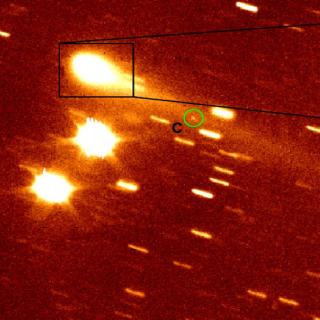Bibcode
Delbo, M.; Gundlach, B.; Lionni, L.; Alí-Lagoa, V.; Licandro, J.; Blum, J.
Referencia bibliográfica
Astronomy and Astrophysics, Volume 561, id.A45, 8 pp.
Fecha de publicación:
1
2014
Revista
Número de citas
34
Número de citas referidas
33
Descripción
Aims: We derive the thermal inertia of 2008 EV5, the
baseline target for the Marco Polo-R mission proposal, and infer
information about the size of the particles on its surface.
Methods: Values of thermal inertia were obtained by fitting an asteroid
thermophysical model to NASA's Wide-field Infrared Survey Explorer
(WISE) infrared data. Grain size was derived from the constrained
thermal inertia and a model of heat conductivity that accounts for
different values of the packing fraction (a measure of the degree of
compaction of the regolith particles). Results: We obtain an
effective diameter D = 370 ± 6 m, geometric visible albedo
pV = 0.13 ± 0.05 (assuming H = 20.0 ± 0.4), and
thermal inertia Γ = 450 ± 60 J m-2
s-1/2 K-1 at the 1σ level of significance
for its retrograde spin-pole solution. The regolith particles radius is
r = 6.6+1.3-1.3 mm for low degrees of compaction
and r = 12.5+2.7-2.6 mm for the highest packing
densities.
Table of observed fluxes is only available at the CDS via anonymous ftp
to http://cdsarc.u-strasbg.fr
(ftp://130.79.128.5) or via http://cdsarc.u-strasbg.fr/viz-bin/qcat?J/A+A/561/A45
Proyectos relacionados

Exoplanetas y Astrobiología
La búsqueda de vida en el Universo se ha visto impulsada por los recientes descubrimientos de planetas alrededor de otras estrellas (los llamados exoplanetas), convirtiéndose en uno de los campos más activos dentro de la Astrofísica moderna. En los últimos años los descubrimientos cada vez más numerosos de nuevos exoplanetas y los últimos avances
Enric
Pallé Bago

Pequeños Cuerpos del Sistema Solar
Este Proyecto estudia las propiedades físicas y composicionales de los llamados pequeños cuerpos del Sistema Solar, que incluyen asteroides, objetos helados y cometas. Entre los grupos de mayor interés destacan los objetos trans-neptunianos (TNOs), incluyendo los objetos más lejanos detectados hasta la fecha (Extreme-TNOs o ETNOs); los cometas, y
Julia de
León Cruz